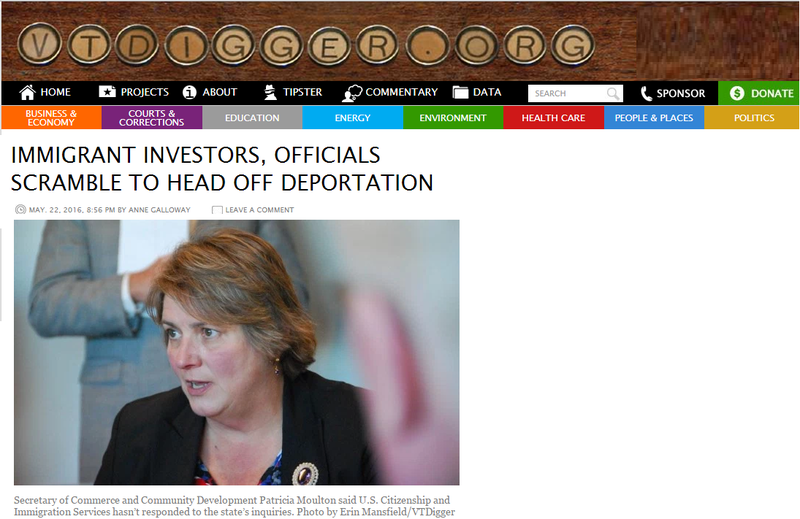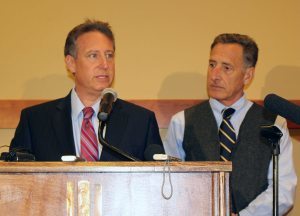Immigrant Investors, Officials Scramble To Head Off Deportation
Immigrant investors who were allegedly defrauded by developers in the Northeast Kingdom are afraid their families will be deported in a matter of weeks unless officials take action very soon.
Mohammed Adil, an Indian investor in the Jay Peak Resort who lives in Dubai, said in an interview that his daughters, who attend Mount Holyoke College in Massachusetts, could be forced to leave the United States on June 23 unless U.S. Citizenship and Immigration Services grants his family an extension of their temporary visas through the EB-5 investment program.
USCIS has refused to comment to the press or respond to state officials who have sought information about the immigration status of investors in Jay Peak and a biomedical facility in Newport that has not been built. The EB-5 program gives foreign investors the opportunity to secure permanent U.S. residency.
Michael Goldberg, the court-appointed receiver for properties in the alleged Northeast Kingdom fraud, and state officials say they are doing what they can to help investors and their families stay in the United States. Goldberg said his first priority was stabilizing the properties and that he is now focused on investors.
“We recognize the issue, and we are on top of it,” Goldberg said. “The immigration status of investors is at the top of the list now.”
Patricia Moulton, Vermont’s secretary of commerce and community development, said that if USCIS starts deporting investors “it will be the death knell for the program internationally.” She said she believes USCIS will at least extend temporary visas for investors to avoid bad publicity.
Adil and 133 other investors each gave the developers of Jay Peak $500,000 to build the Stateside project — a hotel and condo complex, medical center and recreational center at Jay Peak. In exchange, Adil and his family were promised permanent residency in the United States within a few years. He and his family were issued temporary visas in 2013 and applied for green cards in June 2015 with the expectation that they would obtain permanent residency this year.
That expectation was dashed last month when the SEC charged the Jay Peak developers, Ariel Quiros and Bill Stenger, with misusing $200 million in investor funds for projects at Jay Peak, Burke Mountain and the proposed biomedical facility in Newport. The state of Vermont also sued the developers. All of Quiros’ business properties are now under the control of the court-appointed receiver.
The case puts investors like Adil in limbo. The last few developments in what the SEC called the “Ponzi-like” scheme were not started at all (AnC Bio Vermont) or were not completed (Stateside). That complicates the green card approval process for about 400 investors.
Through the EB-5 program, qualified immigrants who invest $500,000 in projects in poor areas are eligible for temporary visas. If each half-million-dollar investment creates 10 jobs after two years — including construction and direct and indirect jobs associated with the operation of the business — immigrant investors can obtain permanent residency.
More than 700 immigrants from 74 countries invested in developments at Jay Peak and Burke Mountain resorts and the proposed biomedical facility in Newport. Hotels, condos, an ice rink, a parking garage and a water park were built at Jay Peak, and developers finished a hotel at Burke Mountain.
But Quiros allegedly used money from AnC Bio Vermont and the Stateside investors to enrich himself and pay for other developments. At Stateside, all $67 million from 134 investors has been spent. Although a hotel was built as part of the project, the condos haven’t been fully constructed, and ground was never broken for planned medical and recreational centers.
Because the Stateside project was not completed, the required jobs were not created, and there is no guarantee the investors will get green cards as promised. The chances that investors will get their money back are even slimmer.
The situation that investors in the proposed AnC Bio Vermont facility face is more dire: Quiros allegedly looted most of the money, and it seems unlikely the biomedical facility will ever be built. Quiros stole $30 million directly from AnC Bio Vermont investors and used an additional $50 million to pay for other projects, the SEC says.
Unless U.S. Citizenship and Immigration Services, the federal agency that authorizes green cards, makes an exception for the Stateside and AnC Bio Vermont investors, they could be deported.
Since the SEC charges were filed, USCIS officials have refused to comment on the immigration status of the investors.
Moulton, the commerce secretary, said USCIS has not responded to queries from the state. “We are still working on getting some answers from USCIS,” she said.
Moulton is urging investors to petition USCIS for visa extensions until the state and the SEC receiver can sort out how to help investors move forward with green cards.
Goldberg, the receiver, said he will post an update Monday to investors on his website and this week will provide new job creation figures, K-1 tax forms and financial information to immigration attorneys for investors who are trying to get visa extensions from USCIS.
The long-term solution for investors, Goldberg said, is more complicated. He has said he will borrow $20 million or more to finish the Stateside condos and thus meet job creation targets for investors. AnC Bio Vermont, however, is more difficult to resolve, Goldberg said, because it’s a costly, complex biomedical project and “the money isn’t there.”
The Jay Peak Resort hotels, condos and other projects have created 15 percent more jobs than anticipated, Goldberg said, and he hopes to persuade USCIS to allow the state to “pool” investors from the AnC Bio project with the Jay Peak projects to “take advantage of the excess jobs.”
Moulton said the state and the receiver will be sending a joint letter to USCIS this week “about the concept of pooling investors so we can wrap in as many of the AnC Bio investors as possible for green card approval.”
Jay Peak is different from other EB-5 fraud cases around the country, according to Gene Fullam, the director of the Vermont EB-5 Regional Center. Although the developers allegedly stole from the projects, Fullam said the business plan has been executed, jobs have been created, and “we have underlying assets that are income-producing.”
The additional jobs allow “tremendous optionality to do financial engineering,” Fullam said.
Moulton said USCIS could make such decisions if it chooses to. “I think they understand if victims get deported through no fault of their own, that’s going to generate negative publicity and it’s a policy decision that will reflect poorly on the program,” she said.
USCIS, however, has not communicated openly with state officials or with Sen. Patrick Leahy, D-Vt. Goldberg has had a brief conversation with the federal officials. “I have no idea how long it will take to hear back from them,” Moulton said. Leahy’s office has had “no greater luck,” she added.
The Vermont EB-5 Regional Center was responsible for overseeing the Jay Peak, AnC Bio Vermont and Burke Mountain developments, but officials did not review the project financials and didn’t pay attention to red flags that pointed to the fraud until late 2014.
Stenger, the former CEO of Jay Peak, touted the state’s oversight in his pitch to investors and used video clips and letters from Leahy and Gov. Peter Shumlin supporting the projects to sell the projects to investors.
Adil blames the state for promoting fraudulent projects, and he said it is now the state’s responsibility to ensure that investors get visa extensions as quickly as possible.
Adil, 49, says he grew up poor in a village in India and is a graduate of Harvard College. He is now the CEO of a fashion retail company based in Dubai. He invested $500,000 in Jay Peak to provide his four daughters with a first-class education in the United States.
He said he was attracted to the EB-5 program in Vermont because he thought it would be a safe investment.
“I come from a country where citizens cannot always count on the government and corruption abounds,” Adil wrote in a letter to Leahy. “But America is supposed to be different, that is why we are so trusting in giving over our savings to Vermont, knowing it would be protected by the appropriate state and federal agencies.”
Adil said in an email to VTDigger that his daughters are going “through severe trauma not knowing their future.”
“We are going through a difficult time by simply not having any credible information on our immigration status,” Adil said. “We really don’t understand what’s our fault.”
https://vtdigger.org/2016/05/22/immigrant-investors-officials-scramble-to-head-off-deportation/
Mentions
- Vermont EB5 Regional Center
- Jay Peak - Q Burke Mountain Resort, Hotel and Conference Center L.P.
- Jay Peak - AnC Bio Vermont
- U.S. Citizenship and Immigration Services
- UNITED STATES SECURITIES AND EXCHANGE COMMISSION
- Ariel Quiros
- Bill Stenger
- Patrick Leahy
- Peter Shumlin
Litigation Cases
- State of Vermont vs Bill Stenger & Ariel Quiros
- UNITED STATES SECURITIES AND EXCHANGE COMMISSION vs Ariel Quiros & Bill Stenger
States
- Vermont
Securities Disclaimer
This website is for informational purposes only and does not constitute an offer or solicitation to sell shares or securities. Any such offer or solicitation will be made only by means of an investment's confidential Offering Memorandum and in accordance with the terms of all applicable securities and other laws. This website does not constitute or form part of, and should not be construed as, any offer for sale or subscription of, or any invitation to offer to buy or subscribe for, any securities, nor should it or any part of it form the basis of, or be relied on in any connection with, any contract or commitment whatsoever. EB5Projects.com LLC and its affiliates expressly disclaim any and all responsibility for any direct or consequential loss or damage of any kind whatsoever arising directly or indirectly from: (i) reliance on any information contained in the website, (ii) any error, omission or inaccuracy in any such information or (iii) any action resulting therefrom.






